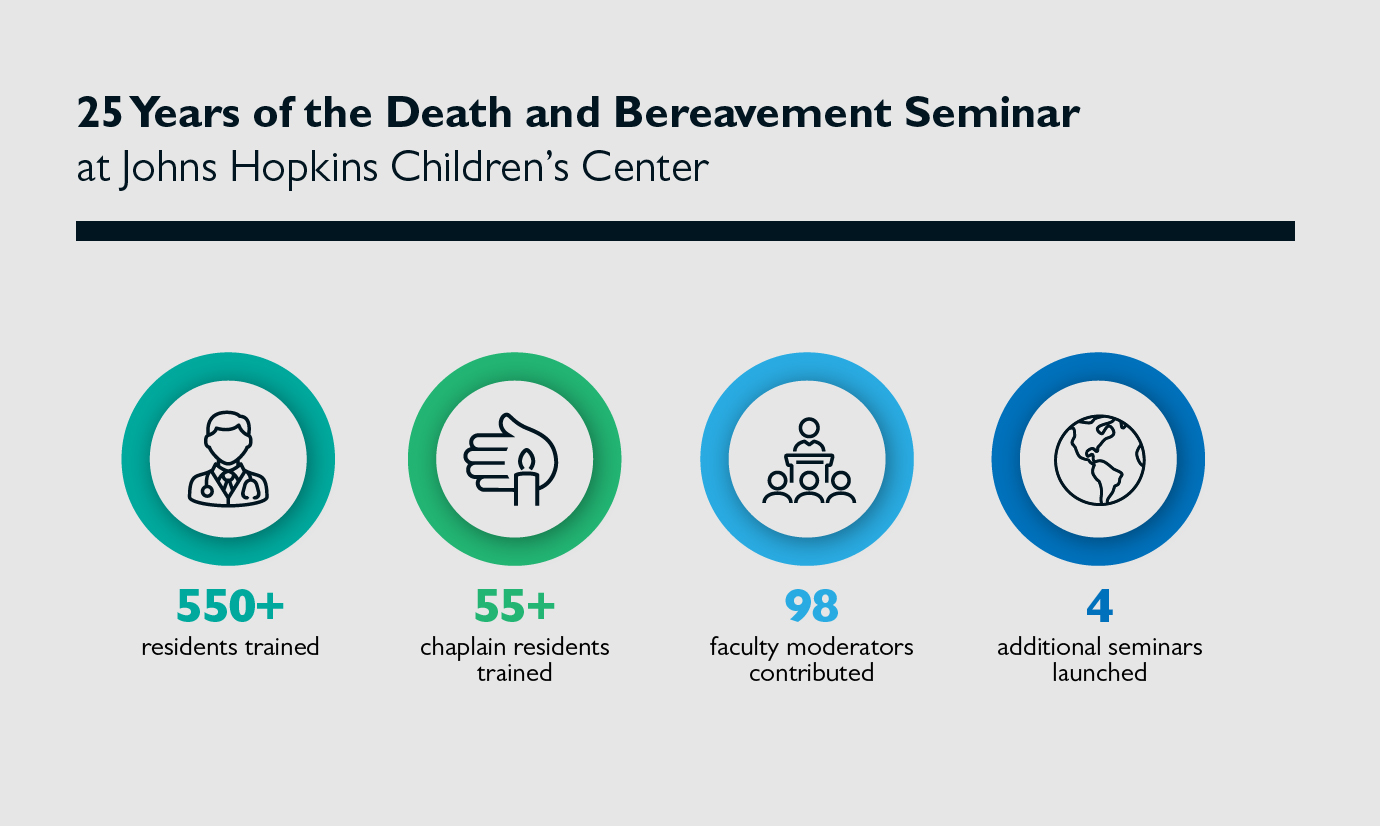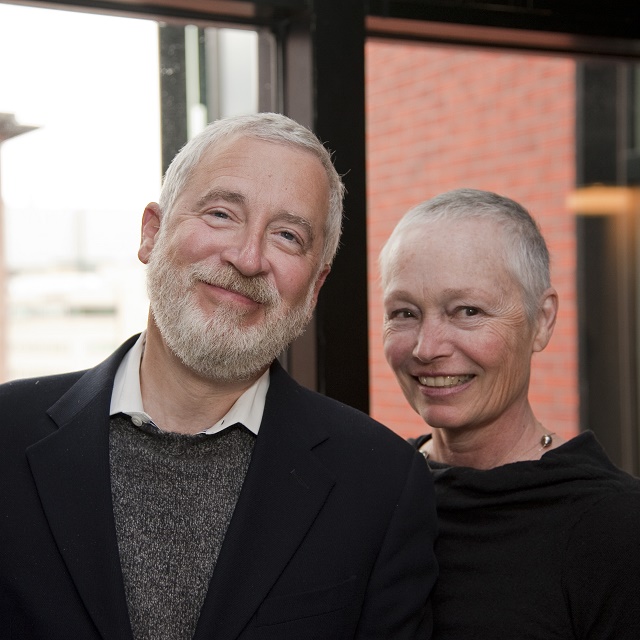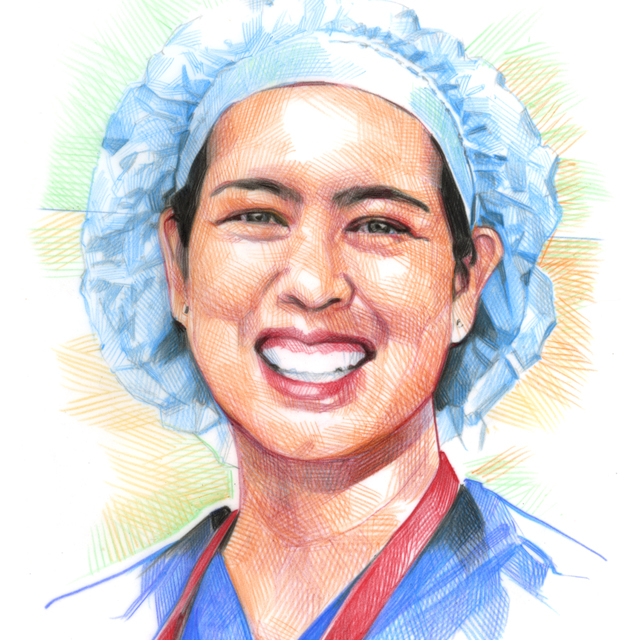As she faced the parents who were worried sick about the condition of their infant, Hila Sella confronted one of the most difficult encounters any doctor can have. Choosing the wrong word, smiling at the wrong time, sitting too close or too far away, talking too much — any of these could trigger anger and hysteria in parents struggling to fathom news that their child has died.
The situation was unfolding at the annual death and bereavement seminar held at Johns Hopkins Children’s Center. Although the pediatric resident knew she was participating in a simulated exercise with actors playing the parts of the parents, the force of their emotions soon enveloped her.
“It felt very real,” Sella says. “Their reactions broke any disbelief I could have that this is a fake scenario.”
The situation, based on a real case, was this:
That morning Jim and Lisa Redding found their 2-month-old son Christopher unresponsive in his crib. They immediately called the paramedics, then followed the ambulance to the hospital. When Sella met up with them, they had spent at least 30 minutes waiting for some news — any news — about how their baby was doing.
Sella first asked the couple what their understanding of the situation was. Then, after Jim gave her his play-by-play recap, she sat down in front of him, hands folded on her lap. She leaned forward and made eye contact with both parents.
“I want to tell you I’m coming in with some bad news today,” she said. “Christopher has died.”
In shock, Jim became confrontational. “What did you say?” he demanded. Lisa became hysterical, crying and yelling.
The next painful moments offered Sella the opportunity to practice crucial aspects of her role: how to comfort a crying mother, disarm an argumentative father, and explain the uncertainty surrounding the child’s death along with plans to determine its cause. She would learn when to tell them that they could spend time with their son whenever they were ready.
While the case was based on a real patient, the husband and wife were “standardized patients” — people trained to act like actual patients. After three interactions, they gave Sella feedback on how she handled the situation, as did four fellow residents and a faculty facilitator who were also in the room.
The young physician was one of 28 second-year pediatric residents and four chaplain residents to take part in the daylong death and bereavement seminar, which Johns Hopkins Children’s Center has held for 25 years. The workshop offers residents an opportunity to hear from real parents whose children have died, while providing them a safe space to refine their communication skills and learn to maintain their own well-being in such emotionally distressing situations. Faculty colleagues and chaplains speak about their work and how it intersects with the seminar’s topics, and how they can support families and clinicians.
“[It’s helpful] knowing the words, and practicing the ways to best help families during these times of crisis … even if it’s just to be silent and sit with them, because it never gets easy,” says Shira Ziegler, a pediatric and medical genetics resident who participated in the seminar.
Although Ziegler had already experienced real situations in which she told parents that their infant had died, she never went alone to deliver the news. The bereavement simulation, where fellow residents observe but do not intervene, gave her an opportunity to practice what delivering such news might be like at an institution with less support than Johns Hopkins.
The day also gave her the chance to process the deaths she had witnessed so far in her residency.
“Every time you have to do this, in real life or in a simulation, all the previous emotions and experiences you’ve had with other dying children flood in,” Ziegler says. “It was my first opportunity to think about what’s gone on in my time as a doctor, and to reflect on all of the kids that we’ve lost. We don’t really have a space to think about that often.”
The program is sponsored by the Cameron Kravitt Foundation. It was founded in 1982 by Jason and Beverly Kravitt in memory of their second child, Cameron, who was delivered stillborn in a Chicago hospital that year. The couple’s grief was exacerbated by how poorly the hospital and its clinicians handled the situation. The foundation became their way to ensure that other parents wouldn’t suffer similar experiences. (See sidebar)
“When you have a child die, you want to make something out of it beyond the tragedy,” Jason Kravitt says. “To be able to lessen people’s grief and help them treasure the love they have for their child who died and for each other — I cannot describe the sense of joy that gives us. And it makes Cameron’s life very meaningful.”

The foundation started working with Johns Hopkins in 1995, formulizing what would become the seminar with Janet Serwint, the former director of pediatric resident training who remains the program director; the late Frank Oski, who was director of pediatrics at the time; and pediatrician Lorene Rutherford, who completed her residency at Johns Hopkins.
Serwint faced her own tough moments when children on her unit died when she was a pediatrics intern in a California hospital nearly four decades ago. At the time, she had little support for processing her feelings.
“Having that happen at such an early stage … made me realize how much impact these experiences have on all of us as health care providers,” she says.
Under the direction of Serwint and her colleagues, the foundation and Johns Hopkins held the first death and bereavement seminar in 1996.
In its 25 years, the program has trained more than 550 residents and more than 50 chaplain residents, and program alumni now practice in 39 states. Johns Hopkins has helped launch the seminar at four other pediatric residency programs — New York-Presbyterian Hospital/Weill Cornell Medical Center (2006); the University of California, San Francisco (2017); the University of Cambridge/East of England (2017); and the University of Chicago, which held its first seminar on Jan. 24, 2020, two days after the 25th seminar at Johns Hopkins.
Serwint and others, including Rutherford, who is now practicing pediatrics in Minnesota, train clinicians at the other institutions to help them conduct the seminar at their institutions. Last year, the Cameron Kravitt Foundation fully endowed the Johns Hopkins program, so it should go on in perpetuity and allow it to continue to expand, Kravitt says. He travels to every seminar at each institution, giving an impassioned speech about what his family went through.
Giving Clinicians the Safe Space They Need
The seminar also provides residents opportunities to learn how to carefully choose their words and understand the reactions of parents during this tragic time.
The goal of Sella’s second interaction with the grieving couple was to tell them that in cases where an infant is found unconscious at home, an autopsy is required. The couple was staunchly against it, becoming indignant at the idea of an autopsy and demanding to know why they could not opt out. Sella gently explained that it is mandated by the state, and she was able to answer their questions about the procedure. Ultimately, the family agreed to the autopsy.
“This is the worst day of somebody’s life, and we have to approach it with respect and kindness,” Sella says. “I’m glad that I got the opportunity to practice in a safe space before delivering this type of news for the first time.”



